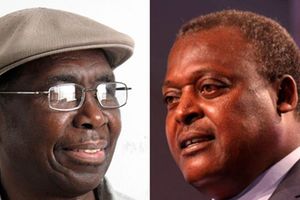Premium
Egypt seeks Kenya's support in row with Ethiopia over dam

President Uhuru Kenyatta (right) with Egyptian President Abdel Fattah al-Sisi during a past event.
What you need to know:
- Kenya says a solution to the stand-off should be found through the African Union, arguing that external entities may bring their interests to the matter.
- An attempt by the US to broker a deal failed to reach an agreement after Ethiopia pulled out of the talks, citing bias from Washington.
Egyptians are seeking Kenya’s support to help Cairo reach an amicable solution on the use of the waters of the Nile, after Ethiopia erected a dam along the river.
The revelation came out of a meeting between President Uhuru Kenyatta and his host Abdel Fattah al-Sissi this week as the former stopped over from France.
A statement from State House only indicated that they discussed subjects of mutual interest “among them regional peace and security, trade and Africa's response to Covid-19.”
But the Egyptian officials said the two leaders had agreed to work closely on the issue of the Grand Ethiopian Renaissance Dam (GERD) currently under construction on the Blue Nile.
“The meeting touched on the latest regional developments of mutual interest, especially in relation to the issue of the renaissance dam, where it was agreed to intensify coordination between the two countries in the coming period on this sensitive and vital issue,” a spokesperson for al-Sissi said.
Ethiopia is putting up the GERD, worth about $4.8 billion raised entirely from local contributions.
The Nile, Africa’s longest river, has a basin that includes 10 countries including Kenya, Uganda, Tanzania, South Sudan, Rwanda Burundi and the DR Congo. But Egypt sees the construction of the Ethiopian dam on the Blue Nile, which contributes 85 per cent of the River Nile waters, as a risk to future source of water for irrigation, hydropower generation and domestic use.
African Union Chairperson Cyril Ramaphosa has recently organised various sittings between Ethiopia, Sudan and Egypt to help them agree on the appropriate use of the water without harming each other’s sovereign rights. A deal has yet to be hammered but Ethiopia insists the dam is only to serve its right to utilise a natural resource to produce electricity.
Officials in Addis Ababa have argued that the dam will not withhold nor divert the water as hydroelectric power generation is the only use of the facility, situated in the Benishangul-Gumuz region.
Egyptians maintain they want a deal done, but say the Nile is a national security issue.
“Mr President emphasised [that] the water issue is of the utmost importance to the Egyptian people as a matter of national security, and Egypt therefore adheres to its water rights through a legal agreement that guarantees clear rules for filling and operating the dam, and achieves the common interests of all parties,” the Egyptian Presidency spokesman said.
In July, Ethiopia went ahead to fill a portion of the completed dam reservoir in defiance of Sudan's and Egypt's warning not to do so without an agreement. Khartoum and Cairo fear that Ethiopia's $4.8 billion mega dam project will eventually diminish their historic water share from the Nile River.
Kenya says a solution to the stand-off should be found through the African Union, arguing that external entities may bring their interests to the matter. An attempt by the US to broker a deal failed to reach an agreement after Ethiopia pulled out of the talks, citing bias from Washington.
The US had drafted an agreement which Egypt initialled, but Sudan and Ethiopia declined. The matter was brought to the African Union as tensions built.
Ethiopia said Wednesday it is ready to continue discussing the proposals through the African Union.
“As a champion of African causes, Ethiopia is always for African solutions. The way forward for GERD, as always, is the mantra ''African solutions for African problems,” Meles Alem Tekea, Ethiopia’s Ambassador to Kenya, told the Nation.
“The trilateral meeting headed by the current chair of AU is going in that spirit and it is bearing fruit.”
The countries have failed to agree whether the dam should be filled based on seasonal rains or at flat gradual timetable, something that could delay or speed up the actual filling. They have yet to agree on whether a third party should resolve disputes arising from the dam operations.
Ethiopia argues that the hydroelectric power plant project being built some 30 km from the Sudanese border will ease the severity of deadly flooding in Sudan. This year, floods have killed at least 150 people in Sudan.
The African Union (AU) brokered the last round of talks between Ethiopia, Sudan and Egypt which ended in August without any major breakthrough.
On Tuesday, Ethiopian authorities shut down a section of the country's airspace in the Benishangul-Gumuz region, where the GERD is being built.
Officials cited security reasons behind the closure of that region's airspace amid unresolved issues between Ethiopia, Sudan and Egypt on the use of the waters of the Nile.





